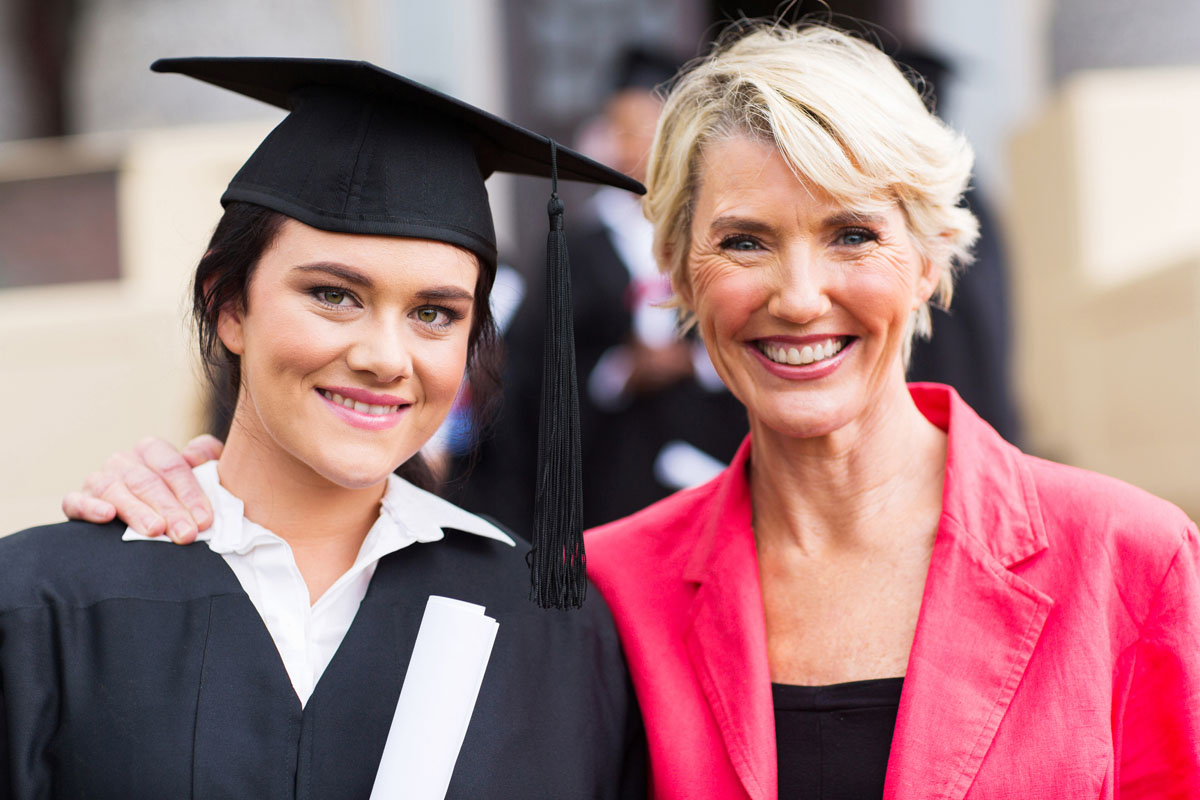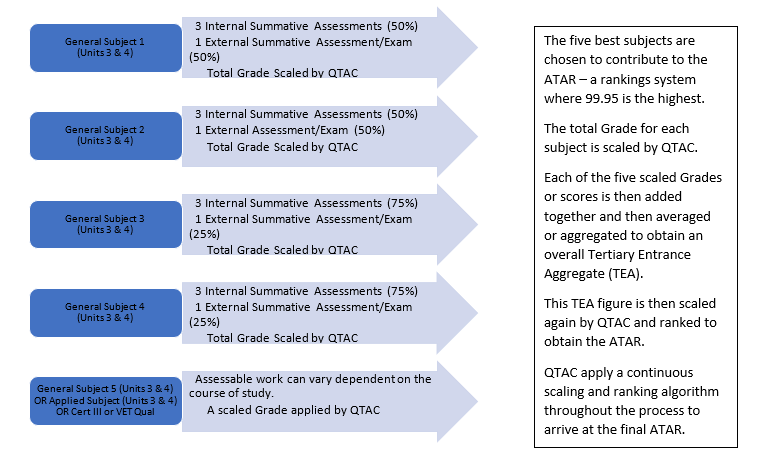Trying to get your head around QCE and ATAR? You’re not alone! To summarise, QCE (Queensland Certificate of Education) is a qualification/certificate received for successfully completing high school level education in Queensland. The ATAR (Australian Tertiary Admission Rank) is the score or ranking from 99.95 down to <30.00 that is used for admission to university.
What is QCE?
The Queensland Certificate of Education (“QCE”) is the qualification students get for completing senior school education.
Most students will get the QCE at the end of Year 12, along with their Senior Statement which shows all their studies and results that contributed to their QCE.
If students don’t meet all the requirements for a QCE by the end of Year 12, there are options to finalise their learning and obtain the QCE beyond Year 11 and 12. At A Team Tuition, our aim is to help your child get their QCE and their desired ATAR score for university admission by the end of Year 12, rather than extending their time in high school.
How do I get a QCE?
● First, students need to be registered with the Queensland Curriculum and Assessment Authority (“QCAA”).
Schools will have helped students through the QCAA registration process in Year 10. Your school should also have developed a SET plan with your child to help them achieve their QCE over the next two years.
● Second, students need to obtain 20 credits in the required pattern of subjects AND fulfill certain literacy and numeracy requirements. All 20 credits must be of a Sound Achievement (SA) or better – there being five levels of achievement, from Very High Achievement (VHA) to Very Limited Achievement (VLA).
To get a QCE, a minimum of 12 credits have to come from Core studies. The remaining 8 credits can come from a combination of Core, Preparatory or Complementary Course subjects/studies.
Does Year 11 count for QCE? What about ATAR?
Year 11 does count towards the QCE. The 12 credits from “Core” subjects are studied over Year 11 (Units 1 and 2) and Year 12 (Units 3 and 4). And those credits need to be of “Sound Achievement” or better to obtain the QCE.
Year 11 (Units 1 and 2) do not count towards the ATAR score. However, as the level of achievement attained in the Year 11 subjects are often prerequisite to the subjects chosen for Year 12, they can indirectly affect the ATAR achievable.
The planning for senior schooling starts in Year 10 and the process for achievement is begun in Year 11. A poor result in Year 11 could leave your child floundering and altering their expectations for Year 12 and tertiary education beyond high school.
How is the difference between QCE and ATAR relevant?
Every pass and fail from Year 11 and Year 12 counts towards the QCE and is recorded on the Senior Statement. The QCE is awarded for successfully completing senior schooling at a “passing grade” or above, in at least the 20 credits required. While the Senior Statement will show the level of achievement on a scale of Very High Achievement to Very Limited Achievement, it will not determine entry to tertiary education.
The ATAR score determines entry to university. The Queensland Tertiary Admissions Centre (“QTAC”) will calculate the ATAR score based on the results achieved in the summative assessments and exams from a student’s five best General subjects (certain subjects are not counted for ATAR). The highest ATAR achievable is 99.95
Units 1 and 2 completed in Year 11 do not count towards the ATAR score. However, Year 11 is more than just a “dress rehearsal” for Year 12. Units 1 and 2 completed in Year 11 are the foundation blocks for Units 3 and 4 completed in Year 12.
How do QCE points work?
Students must achieve 20 total credits to receive their QCE. At least 12 credits must be achieved through Core courses. The remaining 8 credits can also be obtained through successful completion of Core courses, or alternatively, those 8 credits may be achieved through a combination of preparatory and VET qualifications and other modes of accepted learning.
Each unit of study (semester) in Core courses (for general and applied subjects) accrues a credit each to the QCE. Year 11 students will generally complete Unit 1 and 2 for each core course subject and will receive 1 credit for each Sound Achievement or better. In Year 12, the students must achieve a C Grade or better for Units 3 and 4 of the core courses to receive 2 credits. Students need to achieve at least 12 SA credits in the Core subjects.
A great visual of how the QCE credit combinations can work is given on pages 3 and 4 of this QCAA fact sheet. Year 11 consists of Units 1 and 2. Year 12 is the completion of Units 3 and 4. The fact sheet also provides a great demonstration of how success or lack of it in Year 11 can determine the subject studied the following year. Bearing in mind that the subject choice in Year 12 can have an effect on the ATAR achievable, you can see how important Year 11 is in relation to the QCE and ATAR.
How are points calculated for ATAR?
The ATAR score is not a “mark”, it is a percentile ranking against all other students in Queensland. So an ATAR of 85.00 does not mean a student achieved 85%, it actually means they are in the top 15% (or they beat 84.99999%) of Queensland students. Bonuses are applied after the ATAR is calculated and does not change the ATAR.
The ATAR is calculated from a student’s five best Year 12 (Units 3 and 4 of the QCE) General Subject results OR their 4 best Unit 3 and 4 General Subject results and 1 Applied, Cert III or Higher VET qualification completed in their QCE studies. Each of these results go through a detailed scaling process which adjusts for things like the level of difficulty in getting a higher result in a subject. Eventually a mark is determined and further scaled and ranked to give an ATAR. There is a complex set of calculations that is performed by QTAC in determining the ATAR.
Core General subjects in Units 3 and 4 have their grades based on 3 Internal Assessments and 1 External Assessment. The External assessment is the same assessment (exam) for every student completing that subject. For General Mathematics and Science subjects, the external assessment represents 50% of the grade for that subject. For all other subjects, the exam represents 25% of the grade for that subject.
As a general rule the very high ATARs are only possible from those based on 5 General subjects (rather than the 4 General/1 Applied, Cert or VET combination) as a result of the scaling applied. However, certain subjects (like physics or mathematics) won’t increase a student’s ATAR. Good performance in a student’s chosen subjects will increase the ATAR, which is why it is so important to plan for success in the subjects chosen.
How do we arrive at an ATAR?
This is an example of the process used to produce the ATAR, remembering that any 5 General Subjects can be used. In this example, General Science and General Mathematics are used for two of the subjects to show how a student’s final grade may be highly dependent upon performance in the final external assessment (or exam). It is important to remember that the ATAR is a rankings system, not a grade.
More information about calculating the ATAR can be found here or here.
What are Core, Preparatory and Complementary Subjects?
The 20 credits required for the QCE can be achieved through a wide range of learning options. The courses of study are divided into 3 categories – Core, Preparatory and Complementary courses.
Core Courses
The QCE must have at least 12 credits from Core studies. These studies include the Applied and General subjects in Year 11 and 12 (Units 1, 2, 3 and 4), VET qualifications of Certificate II or higher, school based apprenticeships and school based traineeships. The maximum credits available for each of these will vary. As a guide, a Sound Achievement on one semester or unit of learning will equate to 1 credit.
Learn More About How to Get A Grades in Core Subjects
Preparatory Courses
Preparatory courses can contribute up to a maximum of 4 credits to the QCE, are of less depth and complexity than Core subjects, and provide foundational learning. They include QCAA short courses, VET Cert I and other recognized study. As a guide, one short course with a C Grade or better would equate to 1 credit.
Complementary Courses
Complementary courses can contribute up to a maximum of 8 credits to the QCE and are most often of greater depth or complexity than Core courses. University subjects, Diploma and Advanced Diploma qualifications completed while a student is enrolled at school can contribute to the QCE. As a guide, a passing grade in one semester of a university subject would be worth 2 credits in the QCE.
How do I improve my QCE Points and ATAR rank?
Successful completion of the QCE is the culmination of results from both Year 11 and Year 12. If students have their heart set on a particular university degree, then it is critical that the necessary ATAR is achieved (along with completing any pre-requisite subjects).
Crucially, student planning for the QCE and ATAR starts in Year 10, and is steadily built upon through Year 11 and 12. Failure in subjects in Year 11 can drastically alter the direction of study required in Year 12 in order to achieve the QCE, and it can potentially crush dreams of tertiary study. A Team Tuition is focused on giving students the tools for success and helping them reach their full potential – a plan for achievement in high school and beyond.
The ATAR is wholly dependent on the level of success your student achieves in their Unit 3 and 4 (Year 12) components of their 5 best General subjects. The key to a great ATAR is ensuring the highest possible achievement in your child’s 5 best subjects undertaken in Year 12. And that journey for success starts in Year 11. Remember, it is the results from the 5 General subjects or 4 General+1 Applied completed in Year 12 that is going to count to the ATAR – however, the ability to choose the subject they need will depend on the student’s successes in Year 11. Directing the maximum effort on the 5 subjects your child is going to rely on for the ATAR is what is going to make the difference and will pay dividends in the long run.
Planning for QCE and ATAR
Ultimately, achieving the QCE and a high ATAR score at the end of Year 12 are the fruition of solid early planning and consistent implementation throughout Years 11 and 12. A Team Tuition firmly believes in planning for success and this is where our strength lies in our approach to tuition. A solid foundation in Year 11 drives the outcome in Year 12.
Could a tutor help your child with QCE and ATAR? Get in touch here!
The post QCE Vs ATAR – What’s the Difference Between QCE and ATAR? appeared first on A Team Tuition.
from A Team Tuition https://ift.tt/30QkPDw
via IFTTT



No comments:
Post a Comment